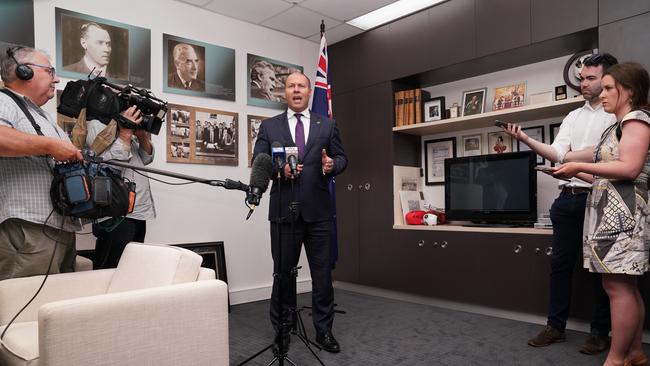Banking royal commission: Government backs compensation scheme, reforms
Morrison government agrees to conditionally back 76 of Hayne’s recommendations, including new consumer compensation scheme.

Consumers and small business ripped off by financial firms will benefit from an industry funded compensation scheme, while a new oversight authority will better hold financial regulators to account under the government’s response to the banking royal commission.
The Morrison government has agreed to act on all of the 76 recommendations made by Kenneth Hayne’s royal commission with Treasurer Josh Frydenberg saying action would be taken to restore trust in the financial system while maintaining access to credit.
“My message to the financial sector is that misconduct must end and the interests of consumers must now come first. From today the sector must change, and change forever,” Mr Frydenberg said.
Mobile users: Download the government’s response here
Under the proposed shake-up, the government would expand the jurisdiction of the Federal Court to fast-track the consideration of corporate criminal misconduct in cases brought by regulators, ensuring they are not delayed by heavy backlogs.
In a major industry shake-up, the government has also agreed to prohibit the payment of trail commissions from lenders to mortgage brokers for new loans made from July 1 2020.
The move will mean that a key source of remuneration for mortgage brokers will be abolished, forcing them to generate more business from up-front fees.
But the government stopped short of endorsing commissioner Hayne’s recommendation that borrowers pay the cost of mortgage broking upfront, saying it would review that recommendation within three years.
The government has also adopted a recommendation to ensure that workers are only defaulted once into a superannuation account — a move that represents a shift from the current model where funds attain default status through enterprise bargaining agreements or the award system.
The adoption of the recommendation puts the Morrison government on a collision course with Bill Shorten, with the existing system overwhelmingly favouring the union-and-employee-backed industry fund sector.
A taskforce will be established to implement the delivery of the government’s reforms and, in three years’ time, an independent inquiry will review whether industry practices have changed.
“The Government will ensure these reforms are implemented efficiently and effectively. To achieve these goals, the Treasury Royal Commission Taskforce, which made several submissions to the Royal Commission, will continue as a Financial Services Reform Implementation Taskforce,” Mr Frydenberg said.
Mr Frydenberg said the government response would strengthen the protections for consumers, small business and regional communities; raise governance standards; enhance the effectiveness of regulators and provide remediation for those harmed by misconduct.
“For the first time the Government will establish a compensation scheme of last resort (CSLR) to ensure that consumers can have their case heard and be confident that where compensation is owed it will be paid,” he said. “This will be a scheme paid for by industry reflecting their obligation to right their wrongs”.
The CSLR will make pay outs to consumers and small business that receive a court or tribunal decision in their favour — or who receive a determination from the Australian Financial Complaints Authority — but are unable to access funds owed to them by the financial firm.
Consumers will be given a 12 month period to apply for AFCA to examine disputes dating back to January 1, 2008 — the period covered by the Royal Commission.
The government’s response also includes a commitment for an immediate review of the co-ordination and funding of financial counselling services to be led by the Department of Social Services to help support consumers.
In a major change to the regulatory landscape, the government has committed to introducing a new independently-chaired body to oversee the industry regulators, including ASIC and APRA.
This will ensure the regulators themselves are complying with the principles of the Banking Executive Accountability Regime while also better measuring their performance and effectiveness.
The Treasurer said that ASIC and APRA’s roles and powers will be clarified, with ASIC becoming the primary regulator of industry conduct.
“For Australians to have trust in the financial system, the regulatory framework must be enforced,” he said. “The government will work with the regulators to ensure that they remain appropriately resourced and will consider what additional funding is required in the 2019-20 Budget context.”
The government has supported recommendations urging APRA to ensure that all institutions which it oversees implement remuneration structures that encourage “sound management” and “reduce the risk of misconduct”.
These bodies would be required to make regular assessments of the effectiveness of their remuneration systems.
The $2.7 trillion superannuation sector faces the prospect of major changes with companies to be banned from hawking superannuation products. Superannuation companies will also be prevented from offering “bundled services” or special deals to employers in order to win “default” status to manage worker savings.
The Productivity Commission has suggested new workers be given a list of 10 top performing funds to choose from, into which they will only be defaulted once. It is likely any move to ensure workers are only defaulted once will break the current “default” system, where funds attain default status through enterprise bargaining agreements.
The new independently-chaired oversight body which will report on the performance of ASIC and APRA — and which has been accepted by government — will have limited powers.
The government has made clear that it will “not have the ability to direct, make, assess or comment on specific enforcement actions, regulatory decisions, complaints and like matters”.
A capability review of APRA will also be led by former head of the competition watchdog, Graeme Samuel — with further capability reviews to be held every four years.
The government has already established that, under its compensation scheme, the cost of compensating individuals who had a prior unpaid determination made in their favour by precedessor bodies of AFCA will see almost $300 million paid to about 300 consumers.





To join the conversation, please log in. Don't have an account? Register
Join the conversation, you are commenting as Logout